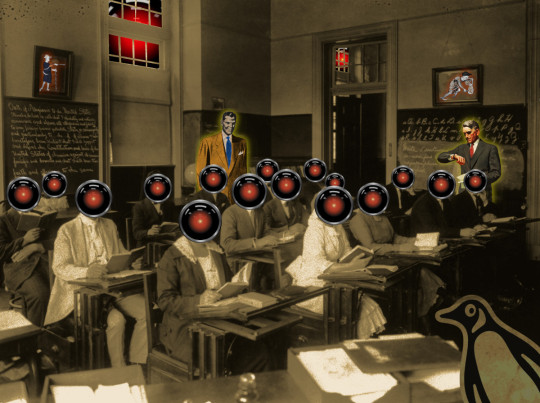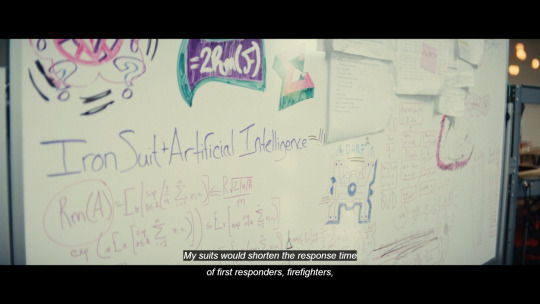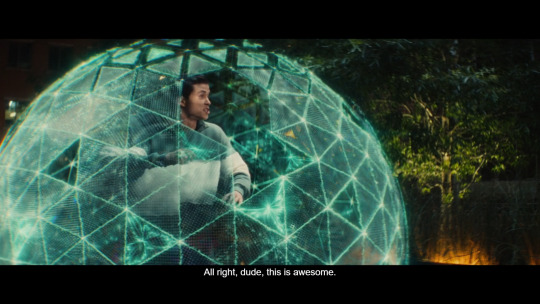#AI-driven public services
Explore tagged Tumblr posts
Text
How AI Is Transforming Public Services in 2026
In 2026, AI is no longer a future promise—it’s the present reality for public services worldwide. Over 70% of government agencies are expected to use AI-powered tools to enhance decision-making, personalize citizen services, and increase operational efficiency. But are they ready?

This in-depth blog from Infosprint Technologies explores how AI, cloud computing, and data analytics are transforming public services—from real-time sentiment analysis to AI-powered virtual assistants that file taxes, guide job seekers, and help citizens access social benefits.
We also highlight:
Cloud’s role in enabling scalable, secure government services
Real-world use cases from Singapore, Estonia, and India
Ethical challenges like algorithmic bias, privacy, and the digital divide
A future roadmap: cognitive cities, AI-as-a-service, and digital twins
Governments must shift from reactive to proactive service delivery. The era of intelligent, inclusive, and citizen-first governance is here. The question is—will your public agency lead or lag behind?
#AI Driven public services in 2026#AI transforming public services in 2026#public service delivery in 2026#AI-driven government solutions#AI-driven public services#What's next in AI for public sector#Digital governance#how public institutions understand and serve their communities#AI's role in personalizing public services#AI-driven threat detection#AI into public services
0 notes
Text
Elon Musk’s Ally Pushes for ‘AI-First’ Strategy in Government Agency
Elon Musk’s Ally Pushes for ‘AI-First’ Strategy in Government Agency In a groundbreaking statement, a close ally of Elon Musk has revealed that embracing an “AI-first” approach is the future for a key government agency. This bold vision outlines how artificial intelligence (AI) will shape the operations and policies of government entities, especially those tied to technology and national…
#AI adoption#AI collaboration#AI in defense#AI in government#AI strategy#AI technology#AI-driven government#AI-first#artificial intelligence#cybersecurity#data analysis#Elon Musk#future of AI#government agency#government reform#Musk&039;s vision#national security#public sector#public services#tech industry#technology innovation
3 notes
·
View notes
Text
Why Kenya's Agritech Startups Struggle to Penetrate the Market Despite Strong Investment
Discover why Kenya’s agritech startups struggle with market penetration despite strong investment, and explore how regulatory challenges and fragmented services hinder growth in the sector. Kenya’s agritech industry faces hurdles beyond funding, including complex regulations and data security concerns. Learn how startups can overcome these challenges to scale and succeed. Uncover the key barriers…
#agricultural technology Kenya#agritech ecosystem#agritech innovation challenges#agritech investment Kenya#agritech market penetration#agritech partnerships#Agritech Startups#AI in farming#climate resilience farming#data privacy in agriculture#data security agritech.#digital agricultural transformation#digital farming tools#digital financial services for farmers#farmer adoption of technology#fragmented service providers#IoT in agritech#Kenya agritech challenges#Kenya’s digital ecosystem#Mercy Corps AgriFin#public sector data in agriculture#regulatory barriers agritech#small-scale farming Kenya#smart farming Kenya#stakeholder engagement in agritech#sustainable agriculture Kenya#tech solutions for farmers#technology adoption barriers#technology-driven agriculture
1 note
·
View note
Text
Penguin Random House, AI, and writers’ rights

NEXT WEDNESDAY (October 23) at 7PM, I'll be in DECATUR, GEORGIA, presenting my novel THE BEZZLE at EAGLE EYE BOOKS.

My friend Teresa Nielsen Hayden is a wellspring of wise sayings, like "you're not responsible for what you do in other people's dreams," and my all time favorite, from the Napster era: "Just because you're on their side, it doesn't mean they're on your side."
The record labels hated Napster, and so did many musicians, and when those musicians sided with their labels in the legal and public relations campaigns against file-sharing, they lent both legal and public legitimacy to the labels' cause, which ultimately prevailed.
But the labels weren't on musicians' side. The demise of Napster and with it, the idea of a blanket-license system for internet music distribution (similar to the systems for radio, live performance, and canned music at venues and shops) firmly established that new services must obtain permission from the labels in order to operate.
That era is very good for the labels. The three-label cartel – Universal, Warner and Sony – was in a position to dictate terms like Spotify, who handed over billions of dollars worth of stock, and let the Big Three co-design the royalty scheme that Spotify would operate under.
If you know anything about Spotify payments, it's probably this: they are extremely unfavorable to artists. This is true – but that doesn't mean it's unfavorable to the Big Three labels. The Big Three get guaranteed monthly payments (much of which is booked as "unattributable royalties" that the labels can disperse or keep as they see fit), along with free inclusion on key playlists and other valuable services. What's more, the ultra-low payouts to artists increase the value of the labels' stock in Spotify, since the less Spotify has to pay for music, the better it looks to investors.
The Big Three – who own 70% of all music ever recorded, thanks to an orgy of mergers – make up the shortfall from these low per-stream rates with guaranteed payments and promo.
But the indy labels and musicians that account for the remaining 30% are out in the cold. They are locked into the same fractional-penny-per-stream royalty scheme as the Big Three, but they don't get gigantic monthly cash guarantees, and they have to pay the playlist placement the Big Three get for free.
Just because you're on their side, it doesn't mean they're on your side:
https://pluralistic.net/2022/09/12/streaming-doesnt-pay/#stunt-publishing
In a very important, material sense, creative workers – writers, filmmakers, photographers, illustrators, painters and musicians – are not on the same side as the labels, agencies, studios and publishers that bring our work to market. Those companies are not charities; they are driven to maximize profits and an important way to do that is to reduce costs, including and especially the cost of paying us for our work.
It's easy to miss this fact because the workers at these giant entertainment companies are our class allies. The same impulse to constrain payments to writers is in play when entertainment companies think about how much they pay editors, assistants, publicists, and the mail-room staff. These are the people that creative workers deal with on a day to day basis, and they are on our side, by and large, and it's easy to conflate these people with their employers.
This class war need not be the central fact of creative workers' relationship with our publishers, labels, studios, etc. When there are lots of these entertainment companies, they compete with one another for our work (and for the labor of the workers who bring that work to market), which increases our share of the profit our work produces.
But we live in an era of extreme market concentration in every sector, including entertainment, where we deal with five publishers, four studios, three labels, two ad-tech companies and a single company that controls all the ebooks and audiobooks. That concentration makes it much harder for artists to bargain effectively with entertainments companies, and that means that it's possible -likely, even – for entertainment companies to gain market advantages that aren't shared with creative workers. In other words, when your field is dominated by a cartel, you may be on on their side, but they're almost certainly not on your side.
This week, Penguin Random House, the largest publisher in the history of the human race, made headlines when it changed the copyright notice in its books to ban AI training:
https://www.thebookseller.com/news/penguin-random-house-underscores-copyright-protection-in-ai-rebuff
The copyright page now includes this phrase:
No part of this book may be used or reproduced in any manner for the purpose of training artificial intelligence technologies or systems.
Many writers are celebrating this move as a victory for creative workers' rights over AI companies, who have raised hundreds of billions of dollars in part by promising our bosses that they can fire us and replace us with algorithms.
But these writers are assuming that just because they're on Penguin Random House's side, PRH is on their side. They're assuming that if PRH fights against AI companies training bots on their work for free, that this means PRH won't allow bots to be trained on their work at all.
This is a pretty naive take. What's far more likely is that PRH will use whatever legal rights it has to insist that AI companies pay it for the right to train chatbots on the books we write. It is vanishingly unlikely that PRH will share that license money with the writers whose books are then shoveled into the bot's training-hopper. It's also extremely likely that PRH will try to use the output of chatbots to erode our wages, or fire us altogether and replace our work with AI slop.
This is speculation on my part, but it's informed speculation. Note that PRH did not announce that it would allow authors to assert the contractual right to block their work from being used to train a chatbot, or that it was offering authors a share of any training license fees, or a share of the income from anything produced by bots that are trained on our work.
Indeed, as publishing boiled itself down from the thirty-some mid-sized publishers that flourished when I was a baby writer into the Big Five that dominate the field today, their contracts have gotten notably, materially worse for writers:
https://pluralistic.net/2022/06/19/reasonable-agreement/
This is completely unsurprising. In any auction, the more serious bidders there are, the higher the final price will be. When there were thirty potential bidders for our work, we got a better deal on average than we do now, when there are at most five bidders.
Though this is self-evident, Penguin Random House insists that it's not true. Back when PRH was trying to buy Simon & Schuster (thereby reducing the Big Five publishers to the Big Four), they insisted that they would continue to bid against themselves, with editors at Simon & Schuster (a division of PRH) bidding against editors at Penguin (a division of PRH) and Random House (a division of PRH).
This is obvious nonsense, as Stephen King said when he testified against the merger (which was subsequently blocked by the court): "You might as well say you’re going to have a husband and wife bidding against each other for the same house. It would be sort of very gentlemanly and sort of, 'After you' and 'After you'":
https://apnews.com/article/stephen-king-government-and-politics-b3ab31d8d8369e7feed7ce454153a03c
Penguin Random House didn't become the largest publisher in history by publishing better books or doing better marketing. They attained their scale by buying out their rivals. The company is actually a kind of colony organism made up of dozens of once-independent publishers. Every one of those acquisitions reduced the bargaining power of writers, even writers who don't write for PRH, because the disappearance of a credible bidder for our work into the PRH corporate portfolio reduces the potential bidders for our work no matter who we're selling it to.
I predict that PRH will not allow its writers to add a clause to their contracts forbidding PRH from using their work to train an AI. That prediction is based on my direct experience with two of the other Big Five publishers, where I know for a fact that they point-blank refused to do this, and told the writer that any insistence on including this contract would lead to the offer being rescinded.
The Big Five have remarkably similar contracting terms. Or rather, unremarkably similar contracts, since concentrated industries tend to converge in their operational behavior. The Big Five are similar enough that it's generally understood that a writer who sues one of the Big Five publishers will likely find themselves blackballed at the rest.
My own agent gave me this advice when one of the Big Five stole more than $10,000 from me – canceled a project that I was part of because another person involved with it pulled out, and then took five figures out of the killfee specified in my contract, just because they could. My agent told me that even though I would certainly win that lawsuit, it would come at the cost of my career, since it would put me in bad odor with all of the Big Five.
The writers who are cheering on Penguin Random House's new copyright notice are operating under the mistaken belief that this will make it less likely that our bosses will buy an AI in hopes of replacing us with it:
https://pluralistic.net/2023/02/09/ai-monkeys-paw/#bullied-schoolkids
That's not true. Giving Penguin Random House the right to demand license fees for AI training will do nothing to reduce the likelihood that Penguin Random House will choose to buy an AI in hopes of eroding our wages or firing us.
But something else will! The US Copyright Office has issued a series of rulings, upheld by the courts, asserting that nothing made by an AI can be copyrighted. By statute and international treaty, copyright is a right reserved for works of human creativity (that's why the "monkey selfie" can't be copyrighted):
https://pluralistic.net/2023/08/20/everything-made-by-an-ai-is-in-the-public-domain/
All other things being equal, entertainment companies would prefer to pay creative workers as little as possible (or nothing at all) for our work. But as strong as their preference for reducing payments to artists is, they are far more committed to being able to control who can copy, sell and distribute the works they release.
In other words, when confronted with a choice of "We don't have to pay artists anymore" and "Anyone can sell or give away our products and we won't get a dime from it," entertainment companies will pay artists all day long.
Remember that dope everyone laughed at because he scammed his way into winning an art contest with some AI slop then got angry because people were copying "his" picture? That guy's insistence that his slop should be entitled to copyright is far more dangerous than the original scam of pretending that he painted the slop in the first place:
https://arstechnica.com/tech-policy/2024/10/artist-appeals-copyright-denial-for-prize-winning-ai-generated-work/
If PRH was intervening in these Copyright Office AI copyrightability cases to say AI works can't be copyrighted, that would be an instance where we were on their side and they were on our side. The day they submit an amicus brief or rulemaking comment supporting no-copyright-for-AI, I'll sing their praises to the heavens.
But this change to PRH's copyright notice won't improve writers' bank-balances. Giving writers the ability to control AI training isn't going to stop PRH and other giant entertainment companies from training AIs with our work. They'll just say, "If you don't sign away the right to train an AI with your work, we won't publish you."
The biggest predictor of how much money an artist sees from the exploitation of their work isn't how many exclusive rights we have, it's how much bargaining power we have. When you bargain against five publishers, four studios or three labels, any new rights you get from Congress or the courts is simply transferred to them the next time you negotiate a contract.
As Rebecca Giblin and I write in our 2022 book Chokepoint Capitalism:
Giving a creative worker more copyright is like giving your bullied schoolkid more lunch money. No matter how much you give them, the bullies will take it all. Give your kid enough lunch money and the bullies will be able to bribe the principle to look the other way. Keep giving that kid lunch money and the bullies will be able to launch a global appeal demanding more lunch money for hungry kids!
https://chokepointcapitalism.com/
As creative workers' fortunes have declined through the neoliberal era of mergers and consolidation, we've allowed ourselves to be distracted with campaigns to get us more copyright, rather than more bargaining power.
There are copyright policies that get us more bargaining power. Banning AI works from getting copyright gives us more bargaining power. After all, just because AI can't do our job, it doesn't follow that AI salesmen can't convince our bosses to fire us and replace us with incompetent AI:
https://pluralistic.net/2024/01/11/robots-stole-my-jerb/#computer-says-no
Then there's "copyright termination." Under the 1976 Copyright Act, creative workers can take back the copyright to their works after 35 years, even if they sign a contract giving up the copyright for its full term:
https://pluralistic.net/2021/09/26/take-it-back/
Creative workers from George Clinton to Stephen King to Stan Lee have converted this right to money – unlike, say, longer terms of copyright, which are simply transferred to entertainment companies through non-negotiable contractual clauses. Rather than joining our publishers in fighting for longer terms of copyright, we could be demanding shorter terms for copyright termination, say, the right to take back a popular book or song or movie or illustration after 14 years (as was the case in the original US copyright system), and resell it for more money as a risk-free, proven success.
Until then, remember, just because you're on their side, it doesn't mean they're on your side. They don't want to prevent AI slop from reducing your wages, they just want to make sure it's their AI slop puts you on the breadline.

Tor Books as just published two new, free LITTLE BROTHER stories: VIGILANT, about creepy surveillance in distance education; and SPILL, about oil pipelines and indigenous landback.


If you'd like an essay-formatted version of this post to read or share, here's a link to it on pluralistic.net, my surveillance-free, ad-free, tracker-free blog:
https://pluralistic.net/2024/10/19/gander-sauce/#just-because-youre-on-their-side-it-doesnt-mean-theyre-on-your-side

Image: Cryteria (modified) https://commons.wikimedia.org/wiki/File:HAL9000.svg
CC BY 3.0 https://creativecommons.org/licenses/by/3.0/deed.en
#pluralistic#publishing#penguin random house#prh#monopolies#chokepoint capitalism#fair use#AI#training#labor#artificial intelligence#scraping#book scanning#internet archive#reasonable agreements
730 notes
·
View notes
Text
Ironheart 01x01 - Take Me Home
EEEEEEEEEEEEEEEE It's finally here EEEEEEEEEEEEEEEE
This is a pretty strong first episode. Coming out of it, I feel like I have a strong impression of who Riri is within the context of the story being told and what ideas it wants to tackle.


This episode positions Riri's father and her friend Natalie as central to her emotional journey. Her dad was a mechanic and uttered the words "Because I could" as his explanation for why he is unnecessarily building a new engine for his car.
A sentiment Riri later echoes to explain to her mom why she's building an Iron Man suit of her own.


By the end of the first episode, it's clear that Riri's motivated to follow in her father's footsteps. What happened, exactly, to Natalie and to her dad isn't clear yet but it's pretty strongly implied that they're dead.
Riri does have another, more specific reason for building the suit.




A rose-colored view of Tony's legacy but the point is that Riri is building Iron Man suits for emergency services. We'll give her benefit of doubt here and assume that by "first responders", she means EMTs. Marvel is pretty tone-deaf but I have to hope they didn't mean this line to suggest that she's making Iron Man suits for cops.
It goes unstated, at least in this episode, but this too feels like it links back to her father and Natalie. As if Riri's driven by the trauma of whatever happened to them, and is creating the tools that could have saved them if public services had been armed with them then.
(My money's on car crash.)
However, she's held back by the ugly reality of Tony Stark's privilege. Riri's plight here really goes to lay bare how fortunate Tony was. He was a mega-genius, yes, but he also just happened to be born into the lap of luxury. He was blessed with infinite time and infinite wealth that he could use to see his ideas to fruition.
Riri has to fund her suit by siphoning away her grant money and also selling homework to rich kids as a side hustle.


And as for time, working on her project means she's not working on what she's actually supposed to be at MIT for: Her degree.




For Riri, this project is her life's work. It's what matters to her. She sees no value in actually getting her degree because there's nothing waiting out there for her anyway.
She's the voice of a generation of college graduates who racked up tens of thousands of dollars in student debt just to work in an Amazon warehouse.
But Riri also has a bit of an ego on her, and it feels like that's being set up as her thematic conflict.



"You want me to be small."
This idea comes up quite a bit in this episode.



She's driven by her dad and by Natalie, but she also wants to be seen doing it.


Riri aspires to greatness and has a mega-genius mind to rival some of Marvel's greatest thinkers, but she's limited by her circumstances. After her expulsion from MIT, her family and friends want her to stay in Chicago, but she just sees that outcome as languishing in mediocrity.
I get kind of an Echo vibe from this episode. Like coming home and learning to appreciate her roots is going to be a point of focus for the story.
The limitations of Riri's circumstances are further shown in her suit's AI. The quest for a functioning AI she can use as her J.A.R.V.I.S. makes up a subplot of this episode. She had been using a system that M.I.T. had for its students.

It's Clippy. Riri's suit AI is fucking Clippy. Or it was Cilppy until her expulsion causes the school to revoke her access to him, and now she's just S.O.L.
So that's our hero. Opposite Riri, we have the introduction of Parker Robbins, The Hood.

A crime boss putting together a series of heists for yet unrevealed reasons. And, minus Stark's wealth or MIT's grant money, the only option Riri has left to fund her suit.




So begins Riri's dalliance with the demon-possessed crime boss in the stylish cloak. I was wondering whether they were actually going to bring in the demon element and we don't really get confirmation per ce....

But he does keep the cloak in a big steel vault when not wearing it and it whispers demonically, so I have a good feeling about this!
I'm a little nervous about the prospect of another "Character needs to let go of ambition, appreciate what they've got, and be a Friendly Neighborhood Spider-Man" story but I'm nonetheless optimistic. This is just the first of a three-parter debut, but I'm probably going to spread those out over the next couple days so I have time to digest.
14 notes
·
View notes
Text

Just a list of a few Biden accomplishments: And FFS, enough. There was no “cover up” by the Biden family, his team or the mainstream media, who instead, HAMMERED Biden on every gaffe and stammer for months, instead of focusing on the many achievements of the broader administration. Biden is good man, and was a great president. He was decent. He did great things. His fatal flaw might be that he cared too much and worked too hard. The administration was doing great work so fast and on so many fronts.
But you would never know all the good work they did because the only story the media pushed was about Biden’s “decline.”We had the best post-COVID economy in the world by every metric, hundreds of new infrastructure projects, meaningful progress on climate, a big increase in new manufacturing jobs, a HUGE push for labor protections, monopoly busting, etc. It was one of the most progressive and successful administrations in decades
But the mainstream media instead decided to play into right-wing narratives and make it seem like Biden was asleep at the wheel. They ignored all the good things in order to drive outrage, clicks, and advertising revenue instead of reporting on the policies, legislation, and programs that were helping the poor and middle class. This created just enough of an advantage for the right-wing disinformation media machine to dominate narratives and convince voters that Trump, a clear fascist threat, would magically swoop in and save the day. The Times should have been hammering on Project 2025, not playing games with profit-driven editorial decisions.
Now the government is being dismantled, people are being disappeared, Evangelical Dominionists who wrote Project 2025 are manipulating Trump, calling the shots, destroying scientific research and innovation, reversing civil rights, attacking voting protections, increasing wealth inequality, destroying foreign relations, dismantling consumer protections, etc. At the same time, the data-hungry tech accelerationists at DOGE want to enslave us to AI systems, and have infiltrated almost every government agency. They could weaponize our personal data to enforce obedience now that they’ve connected the dots between all our personal records across agencies.
And yet the media is STILL running hit pieces against Biden… and the Democrats! Does leadership at the MSM understand they might be some of the first people the regime lines up barefoot against a wall? Are they truly this disconnected from the reality of what is unfolding before our eyes?
Biden gave 50 years to public service. He was, happily retired, but after four horrid years under Trump, he came back, slayed the Trump monster, and gave us 4 years of prosperity, dignity, values and healing. He fixed infrastructure, brought us back from covid, built strong ties worldwide, helped vets and encouraged brotherhood. What Jake Tapper is now doing is just more bottom feeding, serving no one but himself. Despicable. It is truly the most repugnant effort to discredit one our most effective, decent presidents while there is a clear and present danger, in the White House. Yet, we still don’t see an opinion piece or an actual researched article on the real insanity currently stinking up the oval office. We may never get the stench out.
Once again, the media is trying to deflect and distract from the four alarm fire we are living in, a fascist regime causing permanent damage to our nation.
[Elizabeth Spurlock Lambert]
18 notes
·
View notes
Text
"Microsoft, Amazon and Google among major corporations identified as being part of a “joint criminal enterprise” in helping Israel carry out a genocide in Gaza. The companies have made unprecedented profits from the slaughter of more than 62,000 Palestinians since October 2023.
In a landmark report released on 30 June, UN special rapporteur for the occupied Palestinian territories Francesca Albanese exposes the corporate machinery both sustaining and profiting from Israel’s occupation and apartheid in Gaza and the West Bank – and now its ongoing genocide in Gaza.
The report – entitled “From economy of occupation to economy of genocide” – identifies 48 separate corporate actors in sectors including, arms, tech, construction, tourism, energy, finance, academia and agriculture. According to the report, they represent only the “tip of the iceberg” as the broader web of corporate complicity is far larger.
It outlines how tech giants Microsoft, Alphabet (parent company of Google) and Amazon grant Israel access to their cloud and AI technologies, enhancing the Israeli government’s ability to process data, make decisions and conduct surveillance and analysis.
Israel’s apartheid and military systems require ever-growing cloud storage and computing capacity. To meet these needs, the Israeli government and military’s cloud computing project – known as Project Nimbus – brought Google and Amazon onboard with a $1.2bn contract in 2021.

When the Israeli internal military cloud overloaded in October 2023, Microsoft, Google and Amazon stepped in to provide crucial cloud and AI tech. IDF computer chief Col. Racheli Dembinsky recently described cloud tech as part of “a collection of systems with which the IDF fights to the end”, citing these companies in her onscreen presentation. Dembinsky said: “You have to understand that it’s a platform that’s a weapon.”
What’s more, Microsoft, Amazon and Google have established research and development (R&D) hubs and local data centres in Israel, while they enjoy what the report describes as “unprecedented government-granted access to data and a captive population”. According to Albanese’s report, this has helped unleash “the first AI-driven and livestreamed genocide, while providing the data sovereignty to shield impunity”.
Microsoft reported $70bn in sales and an 18% increase in profits in the first quarter of 2025, boosted by its cloud computing and artificial intelligence business. In the fourth quarter of 2024, Google Cloud revenues increased 30% to $12bn led by growth across core Google Cloud Platform products, AI Infrastructure, and generative AI solutions, while Amazon Web Services segment sales increased 19% to over $28bn.
The report states: “[Israel’s] forever-occupation has become the ideal testing ground for arms manufacturers and big tech – providing significant supply and demand, little oversight, and zero accountability – while investors and private and public institutions profit freely.” ...
this is the first half of the article - read the whole thing here: https://novaramedia.com/2025/07/02/tech-giants-and-british-bank-named-in-francesca-albanese-report-on-gaza-genocide/
Also, the advanced edited version of the UN report can be read and downloaded here:
https://www.ohchr.org/sites/default/files/documents/hrbodies/hrcouncil/sessions-regular/session59/advance-version/a-hrc-59-23-aev.pdf
7 notes
·
View notes
Text
"Just weeks before the implosion of AllHere, an education technology company that had been showered with cash from venture capitalists and featured in glowing profiles by the business press, America’s second-largest school district was warned about problems with AllHere’s product.
As the eight-year-old startup rolled out Los Angeles Unified School District’s flashy new AI-driven chatbot — an animated sun named “Ed” that AllHere was hired to build for $6 million — a former company executive was sending emails to the district and others that Ed’s workings violated bedrock student data privacy principles.
Those emails were sent shortly before The 74 first reported last week that AllHere, with $12 million in investor capital, was in serious straits. A June 14 statement on the company’s website revealed a majority of its employees had been furloughed due to its “current financial position.” Company founder and CEO Joanna Smith-Griffin, a spokesperson for the Los Angeles district said, was no longer on the job.
Smith-Griffin and L.A. Superintendent Alberto Carvalho went on the road together this spring to unveil Ed at a series of high-profile ed tech conferences, with the schools chief dubbing it the nation’s first “personal assistant” for students and leaning hard into LAUSD’s place in the K-12 AI vanguard. He called Ed’s ability to know students “unprecedented in American public education” at the ASU+GSV conference in April.
Through an algorithm that analyzes troves of student information from multiple sources, the chatbot was designed to offer tailored responses to questions like “what grade does my child have in math?” The tool relies on vast amounts of students’ data, including their academic performance and special education accommodations, to function.
Meanwhile, Chris Whiteley, a former senior director of software engineering at AllHere who was laid off in April, had become a whistleblower. He told district officials, its independent inspector general’s office and state education officials that the tool processed student records in ways that likely ran afoul of L.A. Unified’s own data privacy rules and put sensitive information at risk of getting hacked. None of the agencies ever responded, Whiteley told The 74.
...
In order to provide individualized prompts on details like student attendance and demographics, the tool connects to several data sources, according to the contract, including Welligent, an online tool used to track students’ special education services. The document notes that Ed also interfaces with the Whole Child Integrated Data stored on Snowflake, a cloud storage company. Launched in 2019, the Whole Child platform serves as a central repository for LAUSD student data designed to streamline data analysis to help educators monitor students’ progress and personalize instruction.
Whiteley told officials the app included students’ personally identifiable information in all chatbot prompts, even in those where the data weren’t relevant. Prompts containing students’ personal information were also shared with other third-party companies unnecessarily, Whiteley alleges, and were processed on offshore servers. Seven out of eight Ed chatbot requests, he said, are sent to places like Japan, Sweden, the United Kingdom, France, Switzerland, Australia and Canada.
Taken together, he argued the company’s practices ran afoul of data minimization principles, a standard cybersecurity practice that maintains that apps should collect and process the least amount of personal information necessary to accomplish a specific task. Playing fast and loose with the data, he said, unnecessarily exposed students’ information to potential cyberattacks and data breaches and, in cases where the data were processed overseas, could subject it to foreign governments’ data access and surveillance rules.
Chatbot source code that Whiteley shared with The 74 outlines how prompts are processed on foreign servers by a Microsoft AI service that integrates with ChatGPT. The LAUSD chatbot is directed to serve as a “friendly, concise customer support agent” that replies “using simple language a third grader could understand.” When querying the simple prompt “Hello,” the chatbot provided the student’s grades, progress toward graduation and other personal information.
AllHere’s critical flaw, Whiteley said, is that senior executives “didn’t understand how to protect data.”
...
Earlier in the month, a second threat actor known as Satanic Cloud claimed it had access to tens of thousands of L.A. students’ sensitive information and had posted it for sale on Breach Forums for $1,000. In 2022, the district was victim to a massive ransomware attack that exposed reams of sensitive data, including thousands of students’ psychological evaluations, to the dark web.
With AllHere’s fate uncertain, Whiteley blasted the company’s leadership and protocols.
“Personally identifiable information should be considered acid in a company and you should only touch it if you have to because acid is dangerous,” he told The 74. “The errors that were made were so egregious around PII, you should not be in education if you don’t think PII is acid.”
Read the full article here:
https://www.the74million.org/article/whistleblower-l-a-schools-chatbot-misused-student-data-as-tech-co-crumbled/
17 notes
·
View notes
Note
I really appreciate your more nuanced take on AI and general take on accusing authors of using generative AI without any solid proof besides judging an author’s writing quality.
The reality is AI is not going away, and most AI use is being driven by corporations utilizing it in their customer service and work spaces not by single users. The important part of AI is teaching the public what it is and isn’t (eg so many older and young people have the impression it’s the sci-fu version of AI rather than what it actually is: complex statistical modeling)
And like you said there is a massive difference between using full on generative AI and using AI editing programs. I agree people’s knee-jerk reaction to the word AI on this platform is exhausting bc in the real world conversations about AI and where AI is being used has already evolved so far past that. People on this website are still arguing about the morality of using it to edit a paper or write an email meanwhile multiple corporations are using this completely underdeveloped technology for customer service, hiring/resume review and more. We all know how bad this is for us as people, but because AI isn’t going away the convo around AI here needs to evolve into AI policies that protect people rather than “just never use it”. That just isn’t reality, with the number of massive corporations pushing AI. you can continue never touching AI and attempting to disengage with any corporation that attempts to thrust it upon its customers but that will get increasingly difficult and instead we need people pushing for actual responsible use.
Anyway my thoughts come from time spent working in public environmental policy where we talk about AI a lot bc of its high energy and cooling needs. Most of us have accepted that AI and data centers are not really going away and instead are working on how those water and high energy needs can be mitigated.
And I appreciate your message!
This is an incredible point to be made, thank you for sharing it!
8 notes
·
View notes
Text
by Brenda Baletti, Ph.D.
During a press conference with Silicon Valley luminaries during his second day in office, President Donald Trump threw his political support behind a $500 billion private-sector artificial intelligence (AI) project called Stargate.
The joint venture between OpenAI, Oracle, SoftBank and others will fund infrastructure for AI. Among other things, part of that funding will develop AI for early cancer detection and the rapid creation of mRNA cancer vaccines.
But well before Trump’s announcement, Silicon Valley and the U.S. Department of Defense (DOD) had already teamed up to transform U.S. healthcare into an AI-driven system — a system designed to unleash the power of “predictive medicine” for the early detection and treatment of disease, in an individual or population, sometimes even before an illness manifests, according to a new investigative report by Unlimited Hangout’s Max Jones.
The future of predictive medicine depends on data sharing between the DOD, the U.S. Department of Health and Human Services (HHS), which oversees 13 public health agencies, and the private tech sector, Jones wrote.
Predictive medicine will be used for mass surveillance of Americans, and will inform future approaches to pandemics, Jones reported.
5 notes
·
View notes
Text
“Corporate bosses just have their corporate lawyers and public relations hacks brush away such warnings and pleas. One day stories they knew would not have legs if they just kept quiet or mumbled some general words of regret, promising some vague improvements to their products and services.
But year after year, the deadly toll goes up, not down, and the horrors continue. For example, at least 5000 people A WEEK die in hospitals in the U.S. due to “preventable problems,” concluded a peer-reviewed study by Johns Hopkins University School of Medicine physicians in 2016. This is just one of numerous such studies of hospital-induced infections, overuse of antibiotics, medical malpractice or what is called “medical error,” prescribing bundles of drugs that backfire, “accidents,” deskilling and understaffing.
There has been no mass mobilization by either government officials or industry executives to address this staggering toll of at least 250,000 fatalities a year!
Behind these figures are real people with families, friends and coworkers shocked, incensed or despondent over avoidable losses of life and preventable harms. Some of them undoubtedly knew the specific causes and demanded correction and compensation, to no avail.
Avoidable casualties also arise from the sweeping denial of insurance coverage for ill or injured patients by greedy unregulated or underregulated health insurance companies maximizing profits and bonuses for CEOs. Many insurance companies are now using AI to help wear down consumers.
About two thousand Americans a week lose their lives because they cannot afford health insurance to cover prompt diagnosis and treatment costs. System-driven patterns of denial of benefits by health insurers also cause deaths and injuries. The companies have algorithms that automatically delay or deny needed procedures without even seeing a patient’s medical records or speaking with the patient’s physician.”
6 notes
·
View notes
Text
10+ ways technology is changing Public Relations
For brands seeking impact and longevity, technology is becoming the secret weapon in public relations. With real-time data, targeted outreach, and automation tools, agencies now deliver faster, smarter, and more effective PR campaigns. Let's explore how this shift is happening and what it means for the future.
1. AI-powered media monitoring
Artificial Intelligence tools help PR teams track brand mentions, competitor activity, and industry news in real-time. This allows faster response to potential crises and more relevant outreach to journalists and influencers.
2. Social listening tools
PR isn’t just about talking anymore—it’s about listening. Social listening tech helps brands understand public sentiment, uncover trends, and identify potential advocates or critics.
3. Data-driven storytelling
With analytics and insights readily available, PR professionals now craft stories backed by real data. This increases credibility and allows targeted messaging that actually resonates.
4. Influencer collaboration platforms
Digital PR platforms simplify influencer discovery, outreach, and campaign tracking. This helps brands collaborate authentically and measure impact more precisely.
5. Smart press releases
From embedding multimedia elements to tracking reader engagement, digital press releases are now interactive, measurable, and far more effective than their traditional counterparts.
6. Real-time crisis management
Thanks to instant alerts and social dashboards, PR teams can manage a brand crisis the moment it arises—often before it snowballs.
7. Content automation tools
Scheduling tools and AI-assisted writing software streamline content calendars, freeing PR professionals to focus more on creativity and strategy.
8. SEO-integrated PR
Public relations now works closely with SEO, ensuring that brand messages are not only newsworthy but also searchable and shareable.
9. Virtual events & digital launches
Tech allows brands to host press events, product launches, and panel discussions virtually—expanding reach and cutting costs.
10. Blockchain for transparency
Blockchain is starting to play a role in PR, offering transparency in advertising metrics and media spending.
11. Media database platforms
Smart databases help PR professionals find and pitch the right journalist for every story, improving outreach efficiency.
How agencies are adapting
Leading agencies are now blending traditional expertise with cutting-edge tools to create agile PR strategies. The modern-day campaign isn’t just pitched—it’s programmed, measured, and optimized in real-time.
Moreover, TYC Communication, a premier online PR company in Delhi, has consistently embraced innovation to stay ahead in the PR landscape. From data-led media strategies to influencer collaborations and digital storytelling, their comprehensive PR services help brands stay visible, relevant, and respected. Whether it’s for startups or established businesses, TYC offers tailor-made communication solutions powered by technology and driven by creativity.
3 notes
·
View notes
Text
Reddit said ahead of its IPO next week that licensing user posts to Google and others for AI projects could bring in $203 million of revenue over the next few years. The community-driven platform was forced to disclose Friday that US regulators already have questions about that new line of business.
In a regulatory filing, Reddit said that it received a letter from the US Federal Trade Commision on Thursday asking about “our sale, licensing, or sharing of user-generated content with third parties to train AI models.” The FTC, the US government’s primary antitrust regulator, has the power to sanction companies found to engage in unfair or deceptive trade practices. The idea of licensing user-generated content for AI projects has drawn questions from lawmakers and rights groups about privacy risks, fairness, and copyright.
Reddit isn’t alone in trying to make a buck off licensing data, including that generated by users, for AI. Programming Q&A site Stack Overflow has signed a deal with Google, the Associated Press has signed one with OpenAI, and Tumblr owner Automattic has said it is working “with select AI companies” but will allow users to opt out of having their data passed along. None of the licensors immediately responded to requests for comment. Reddit also isn’t the only company receiving an FTC letter about data licensing, Axios reported on Friday, citing an unnamed former agency official.
It’s unclear whether the letter to Reddit is directly related to review into any other companies.
Reddit said in Friday’s disclosure that it does not believe that it engaged in any unfair or deceptive practices but warned that dealing with any government inquiry can be costly and time-consuming. “The letter indicated that the FTC staff was interested in meeting with us to learn more about our plans and that the FTC intended to request information and documents from us as its inquiry continues,” the filing says. Reddit said the FTC letter described the scrutiny as related to “a non-public inquiry.”
Reddit, whose 17 billion posts and comments are seen by AI experts as valuable for training chatbots in the art of conversation, announced a deal last month to license the content to Google. Reddit and Google did not immediately respond to requests for comment. The FTC declined to comment. (Advance Magazine Publishers, parent of WIRED's publisher Condé Nast, owns a stake in Reddit.)
AI chatbots like OpenAI’s ChatGPT and Google’s Gemini are seen as a competitive threat to Reddit, publishers, and other ad-supported, content-driven businesses. In the past year the prospect of licensing data to AI developers emerged as a potential upside of generative AI for some companies.
But the use of data harvested online to train AI models has raised a number of questions winding through boardrooms, courtrooms, and Congress. For Reddit and others whose data is generated by users, those questions include who truly owns the content and whether it’s fair to license it out without giving the creator a cut. Security researchers have found that AI models can leak personal data included in the material used to create them. And some critics have suggested the deals could make powerful companies even more dominant.
The Google deal was one of a “small number” of data licensing wins that Reddit has been pitching to investors as it seeks to drum up interest for shares being sold in its IPO. Reddit CEO Steve Huffman in the investor pitch described the company’s data as invaluable. “We expect our data advantage and intellectual property to continue to be a key element in the training of future” AI systems, he wrote.
In a blog post last month about the Reddit AI deal, Google vice president Rajan Patel said tapping the service’s data would provide valuable new information, without being specific about its uses. “Google will now have efficient and structured access to fresher information, as well as enhanced signals that will help us better understand Reddit content and display, train on, and otherwise use it in the most accurate and relevant ways,” Patel wrote.
The FTC had previously shown concern about how data gets passed around in the AI market. In January, the agency announced it was requesting information from Microsoft and its partner and ChatGPT developer OpenAI about their multibillion-dollar relationship. Amazon, Google, and AI chatbot maker Anthropic were also questioned about their own partnerships, the FTC said. The agency’s chair, Lina Khan, described its concern as being whether the partnerships between big companies and upstarts would lead to unfair competition.
Reddit has been licensing data to other companies for a number of years, mostly to help them understand what people are saying about them online. Researchers and software developers have used Reddit data to study online behavior and build add-ons for the platform. More recently, Reddit has contemplated selling data to help algorithmic traders looking for an edge on Wall Street.
Licensing for AI-related purposes is a newer line of business, one Reddit launched after it became clear that the conversations it hosts helped train up the AI models behind chatbots including ChatGPT and Gemini. Reddit last July introduced fees for large-scale access to user posts and comments, saying its content should not be plundered for free.
That move had the consequence of shutting down an ecosystem of free apps and add ons for reading or enhancing Reddit. Some users staged a rebellion, shutting down parts of Reddit for days. The potential for further user protests had been one of the main risks the company disclosed to potential investors ahead of its trading debut expected next Thursday—until the FTC letter arrived.
27 notes
·
View notes
Text
Top 5 data management mistakes costing UAE businesses millions
Introduction
In an increasingly digital economy, poor data practices have become more than just an IT issue—they are an enterprise-level risk.

Across the UAE, businesses are losing millions annually due to fragmented systems, inconsistent governance, and reactive strategies.
In this article, we’ll unpack five critical data managementmistakes, their tangible costs, and what forward-thinking firms are doing to stay compliant, competitive, and data-resilient in 2025.
1. Fragmented Data Silos Across Departments
While decentralization may speed up local decision-making, it often comes at the cost of data cohesion. Sales, marketing, finance, and operations frequently maintain isolated datasets that never sync—each with its own metrics, definitions, and reporting cycles. The cost? Missed opportunities, duplicated efforts, inconsistent KPIs, and customer insights that are either delayed or distorted due to incompatible sources. Fix: Implement centralized data lakes or unified ERP/CRM systems to bridge these silos. Introduce cross-departmental governance protocols, and enforce scheduled data synchronization to maintain consistency across all business functions.
2. Weak Data Governance and Access Controls
Many UAE businesses still lack formal governance policies. There’s little clarity on who owns the data, who can access it, and how data quality is maintained across systems and touchpoints. The cost? Increased risk of data breaches, GDPR/DIFC non-compliance, unauthorized exposure of sensitive information, and eroded stakeholder trust—especially in sectors like healthcare, finance, and public services. Fix: Deploy a robust data governance framework with clearly defined roles, role-based access controls, automated audit trails, and regular compliance reviews. Embed accountability at every stage of data creation and usage.
3. Overreliance on Legacy Infrastructure
Outdated database architectures, manual Excel trackers, and siloed on-prem systems continue to dominate back-end processes—despite widespread digital front-ends. The cost? Performance bottlenecks during scale, limited real-time data visibility, high IT maintenance overheads, and an inability to integrate with modern analytics or automation tools. Fix: Migrate to cloud-native platforms that support elastic scaling, system redundancy, and embedded analytics. Incorporate APIs for seamless integration with existing digital tools while phasing out legacy dependencies.
4. Lack of Data Quality Assurance
Inconsistent formats, missing fields, outdated records, and duplicated entries remain common issues across enterprise datasets—especially when multiple input sources aren’t standardized.
The cost?
Flawed business reports, poor AI/ML model performance, customer experience setbacks, and incorrect decision-making based on unreliable data.
Fix:
Introduce end-to-end data quality frameworks that include automated validation checks, enrichment protocols, and AI-driven anomaly detection.
Regular audits and cleansing routines should be part of standard operations.
5. Treating Data Strategy as a One-Off Project
Many businesses initiate data initiatives as one-time efforts—an implementation followed by months (or years) of stagnation.
Without ongoing refinement, systems become outdated, and processes lose alignment with evolving business needs.
The cost?
Strategic misalignment, increasing technical debt, and declining ROI on digital investments that fail to evolve with the organization’s goals.
Fix:
Create a living data strategy—an adaptive roadmap reviewed quarterly, driven by key stakeholders across departments.
Tie progress to measurable KPIs like operational efficiency, customer satisfaction, or revenue growth from data-led initiatives.
Turn Costly Data Chaos into Smart Business Decisions: Nordstar Vision
At Nordstar Vision, we help businesses move from fragmented systems to future-ready data ecosystems.
Whether you’re struggling with outdated infrastructure, data silos, or lack of governance, our team brings tailored solutions to help you scale confidently in a data-first economy.
Let’s turn your data into a growth engine.
Reach out to us today at +(971) 50 1108756 or visit nordstartvision.
#data management UAE#business data mistakes#UAE data strategy#data governance UAE#database management Dubai#digital transformation UAE#legacy system issues#cloud migration UAE#data silos#enterprise data solutions#data compliance UAE#Nordstar Vision#data quality assurance#CRM data issues#ERP data integration#UAE business IT risks#data-driven decisions#business analytics UAE#smart data practices
2 notes
·
View notes
Text

Sorry for taking so long to get a new upload out, been busy with IRL stuff over the last month. But I have some art in the works so there is stuff on the way, and some of them are not an illustration for Tales of the Tarmingham Overhead this time. But it is a stand alone drawing relating to Tarmingham, featuring one of the locations on the Overhead and is right in the centre of Tarmingham.
Here we see Danwood and Sanworth pulling into Tarmingham City Centre Station during the rush hour on a warm summers day in 2021 (the reason I choose to set the image around 2021 and not 24 is because I have a piece of lore about a war that starts in 22 that happens in the 29A timeline, and it has something to do with an AI Sentient Machine army. I'll be doing more lore relating to this event, and this war at a later date and when I release the official 29A timeline) while on their usual service to seaside town of Searonby. Tarmingham City Centre is as it's name implies is located in the centre of the city of Tarmingham serving it's main financial and shopping district and is a major interchange and junction on the Overhead with both the line to Ronston Quarter another major junction with lines from there branching off to Walaceton, Searonby, Greenham, and the south city line to band the line to Blburgh Oakland, and the station is where the western city line to Slaidon Marsh begins and is a starting point for the newest line on the Overhead the city circle line, and consists of four platforms.
Opening with the first section of the Overhead in 1864 as part of the line to Walaceton, albeit without delay after an incident that occurred at the station that became the railways first major accident, when a supplies train was driven by a bunch of rioting protesters from the southern part of the city at full speed off the end of the then under construction station with the engines boiler exploding upon impact with the ground, destroying and damaging several nearby buildings in the process with the engines boiler being sent flying thousands of feet into the air and landing inside the hull of a merchant freighter. The station opening as part of the section between GER's terminus at Tarmingham Piccadilly Street and the GE&SEJR's terminus at Ruston Quarter as part of the Overheads efforts to provide easy access to the docks and to allow the overhead to expand further to Walaceton. The station became a major junction for the Slaidon Marsh line after that lines opening in 1876 which allowed passengers to exchange between trains running on that line and the Walaceton line.
Since it's opening the station has gone through at least two redevelopments throughout it's life, with the first from 1971-1974 and the second from 2010-2015, with the bridge it was built on and the stairs leading up to the platforms being the renovated but others the only elements of the original station to remain standing, with the station being the busiest station the Overhead's network and the busiest in Tarmingham with it continuing to fill it's role as the city centres most important public transport hub with the station having since received a third line to serve that being the Circle line which opened in 2017.
Universe 29A and Characters: © GreatEasternJ69
#living machine#livingmachines#living locomotive#living locomotives#tarmingham overhead railway#br class 101#diesel locomotive#railway#dmu#diesel multiple unit#diesel multiple unit's#TFTTOH#Tarmingham#railway_station#train_station#railroad_station#sentient machine#sentient machines#TOHR#rush hour#rush#hour
10 notes
·
View notes
Text
Turkey Real Estate for Sale: A 2025 Investment Outlook
Turkey real estate for sale continues to capture global investor interest in 2025. With a strategic location, an expanding property market, and robust government incentives, Turkey presents a compelling mix of short-term returns and long-term growth. Whether you're an investor, retiree, or lifestyle buyer, this market offers something for everyone.
Why Consider Buying Property in Turkey?
Turkey’s allure lies in more than its geographic bridge between Europe and Asia. The country combines modern infrastructure with rich cultural heritage and an attractive cost of living. Investors are drawn by:
A growing rental market, both short- and long-term
Government programs offering residency and citizenship
Competitive property prices compared to other European markets
Plus, lifestyle seekers find Turkey’s Mediterranean climate and diverse cities ideal for relocation or vacation homes.
Want a deeper breakdown of the buying process and pricing expectations? Explore our full Buying a House in Turkey: Guide and Prices for legal tips, region-specific rates, and expert insights.
Where to Invest: Diverse Property Types and Regions
When browsing Turkey property listings, you’ll notice a vast range of property types:
Luxury Villas in Bodrum and Antalya
Urban Apartments in Istanbul and Ankara
Seaside Homes in Alanya and Izmir
Budget Flats in emerging districts like Kocaeli
Each region has its niche — from high rental yields in tourist hotspots to long-term appreciation in suburban developments.
Second-Hand Homes: The 2025 Trend
As inflation raises the cost of construction, buyers are turning to second-hand homes for value and speed. These resale properties offer:
Immediate occupancy
Lower purchase prices
Established neighborhoods
This trend is particularly strong among foreign buyers seeking ready homes in resort areas.
Turkey Property Market (2013–2024): A Decade of Growth
The past decade saw dramatic growth and resilience in the Turkish property sector. From the introduction of relaxed foreign ownership laws in 2013 to the 2023–2024 post-pandemic recovery, the market has:
Attracted rising foreign investment
Expanded smart home and eco-friendly developments
Remained stable despite global fluctuations
With Turkey’s urbanization and economic growth, 2025 continues this upward trajectory.
Digital Transformation in Real Estate
Today, more than 60% of property buyers in Turkey begin their journey online. Digital listings, virtual tours, and AI-driven recommendations have revolutionized the way buyers search for homes — especially in the second-hand property sector. Buyers are no longer limited by geography or time zones.
Hotspots for 2025 Buyers
Here’s a breakdown of top cities based on investment potential:
Istanbul – A mix of luxury towers and historic townhouses
Antalya – Beachfront homes and resort-style living
Izmir – Stylish modern apartments with sea views
Ankara – Affordable urban living in the political capital
Alanya – Retirement-friendly, affordable, and scenic
Bodrum – High-end villas with year-round rental potential
Each location offers different entry points for different types of investors — from cash buyers to those financing with Turkish mortgages.
Legal Support and Buyer Guidance
Whether you're buying new or resale, Turkey's legal landscape requires careful navigation. Homes Gravity’s licensed consultants provide full legal support, from verifying property titles to handling negotiations. Our services include:
Due diligence reports
Developer background checks
Legal representation during deed transfer
Full cost transparency including taxes, fees, and agent commissions
Homes Gravity: A Smarter Way to Buy in Turkey
Our platform gives access to both public and private property listings across Turkey. While only a portion is visible online, direct consultation reveals exclusive, high-return opportunities not listed elsewhere. Our local experts assist in:
Identifying growth areas before they boom
Understanding true resale value
Avoiding overpriced or legally risky properties
Final Insight: Turkey’s Real Estate Market Is Future-Ready
With its strong fundamentals and evolving digital infrastructure, the Turkey property market in 2025 is more accessible and promising than ever. Whether you're chasing capital growth, passive income, or a new lifestyle, there has never been a better time to buy.
2 notes
·
View notes